|
Advantech MIO-5271
Advantech's MI/O Extension standard and a look at the high-performance 4th Gen Intel Core U-Series-powered MI/O-Compact Single Board Computer as a powerful, low maintenance building block for IoT and intelligent systems design
(by Conrad H. Blickenstorfer)
There is a large number of different CPU board formats for embedded computer projects. Each board format optimizes certain hardware standards and technologies. The advantage of such boards is that they enable inexpensive, scalable, and obsolescence-proof systems solutions — when new CPU technology comes along you can simply put in a new CPU board. The availability of all those boards enables system integrators to concentrate on their expertise in specialized products, rather than having to design entire new systems. 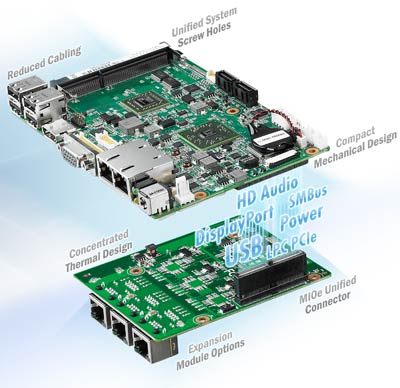 The drawback is that standards-based boards do not always support all interface requirements for a project, and despite the large number of board standards, there simply may not be one that fit special project needs. The drawback is that standards-based boards do not always support all interface requirements for a project, and despite the large number of board standards, there simply may not be one that fit special project needs.
To address this problem, Advantech created the MI/O Extension Single Board Computer. Conceptually, MI/O is between standard single board computers and computers on modules. It's in essence a single board computer with flexible multiple I/O support (hence the name MI/O). There are currently two different MI/O standards:
- MI/O-Ultra measures 100 x 72 mm (same as a 2.5-inch disk) and is for ultra low power TDPs (under 8 watts) with simple I/O.
- MI/O Compact measures 146 x 102 mm (same as a 3.5-inch disk) and is for TDPs up to 40 watts, rich I/O, and mid- to high-end performance. They may therefore include boards with up to standard voltage mobile Intel Core i3/i5/i7 processors and similar designs. The Compact Series also supports extended temperature design and comes with Advantech iManager chip that provides a standardized API for standard platform functions, and a self-management agent with software control functions (see iManager page and iManager white paper).
What does the MI/O Extension standard mean for developers and system integrators? It means there is now a SBC standard that provides substantial additional versatility via MI/O extension modules that connect to the main board through standardized "MIO Unified Connector" high speed sockets. Customers have the option of:
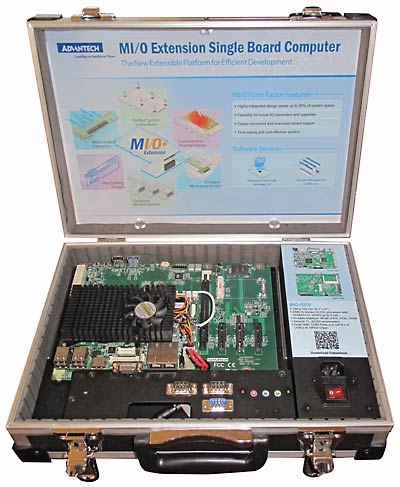
- Off-the-shelf MIO Extension modules
- Custom modules designed by Advantech
- Modules designed by customers
This way, customers have flexible I/O choices to meet the needs of their vertical applications. With pins for PCIe, USB 2.0 and 3.0, LPC, DisplayPort, SMBus, HD Audio and power, MIOe facilitates a completely customized approach to meet any customer interface requirements. The image above shows a MI/O SBC and an expansion module.
Advantech MI/O lineup and resources
Advantech's current MI/O single board computers are the MIO-5xxx Compact series and the MIO-2xxx Ultra series. All MI/O SBCs come with the MIOe unified connector extended interface that connects in stacks, either to modules available from Advantech or to modules developed by clients using the Advantech's design guide. A white paper entitled "Innovative MI/O Extension Single Board Computer" is available here.
The picture to the right shows a Compact Series board inside a special MI/O platform demonstration case that explains and highlights the standard, and includes a MIO-5xxx board, a carrier board, a power supply, and sample I/O expansion ports. Note that this is neither a computer nor a board, but simply a handy package assembled by Advantech to demonstrate the MIO platform.
It's easy to see the many advantages of the MIOe unified connector which note comes in heights from 5 to 25 mm and whose interface function potential includes:
- DisplayPort for HDMI, LVDS, DVI, CRT or eDP display interface
- PCIe x1 for GbE, USB 3.0, SATA/RAID, FPGA or PCI expansion
- USB 2.0/3.0 for high-speed storage, capture card, HD webcam and display interface
- LPC for legacy bus and multi-UART, PS2, GPIO, FDD, IR, Parallel port
- HD Audio for line out, keep flexibility with selected amplifier
- SMBus for GPIO control, smart battery/charger, W/R EEPROM
- Power is supported by the MI/O Extension SBC
The high-performance Advantech MIO-5271 with Intel Haswell power
Back in September 2011, RuggedPCReview performed an initial full review of one of the early Advantech MIO SBCs, the MIO-5270 which was based on AMD's embedded G-Series of processors and remains available as of this writing (July 2014).
|
Available CPUs (see full specs)
|
Intel Core i5
|
Intel Celeron
|
|
Model
|
4300U
|
2980U
|
|
Lithography
|
22nm
|
22nm
|
|
Cores/Threads
|
2/4
|
2/2
|
|
Base Clock Speed
|
1.90 GHz
|
1.60 GHz
|
|
Turbo Speed
|
2.90 GHz
|
No turbo
|
|
Thermal Design Power (TDP)
|
15 watts
|
15 watts
|
|
Smart Cache
|
3MB
|
2MB
|
|
Integrated graphics
|
HD Graphics 4400 (20 EUs)
|
HD Graphics (6 EUs)
|
|
Graphics base speed
|
200 MHz
|
200 MHz
|
|
Graphics max speed
|
1.10 GHz
|
1.00 GHz
|
|
Intel vPro
|
Yes
|
No
|
In our benchmarks, the MIO-5271 scored a 257 in PassMark and 53,000 in CrystalMark, both values a bit above what was possible with Intel Atom-based modules at the time. While suitable for many less compute-intensive embedded applications, more demanding projects may require substantially more performance.
And that's what the new MIO-5271 is for. It offers a choice of two Intel 4th generation "Haswell" processors, the Core i5-4300U and the Celeron 2980U. Don't be misled by the "Celeron" designation — this Celeron is also part of the 22nm Haswell processor lineup and one might view it as a slightly detuned 4th gen Core i3. The table to the right shows the pertinent specs of the two processors.
We were unable to run our usual benchmarks, but, based on our prior benchmarking of both available processors, we have a pretty good idea of what these chips are capable of.
The lower-end Celeron 2980U, for example, is used in the Advantech SOM-6984 Com Express Compact module that we tested in June 2014. The SOM-6984 reached an overall 642.3 PassMark score and clocked CrystalMark at 94,208. This is roughly 2X the performance of the AMD G Series-based MIO-5270.
The also available i5-4300U is a very popular chip in higher-end mobile tablets and notebooks. It's available in such products as the Getac F100 and V110, the Dell Latitude 12 and 14 Rugged Extreme, the Gammatech Durabook S15H, the Xplore Technologies iX104 XC6, and several others. These machines generally score 2,000 or higher in PassMark and around 200,000 in CrystalMark, so we'd expect 4X the performance of the AMD G Series-based MIO-5270.
Below you can see the top (left) and bottom (right) of the MIO-5271 board. Note that the top picture does not show the passive cooling sink that's required to cool the processor and chipset. No fan is needed even for the Core i5-powered version; MI/O's clever thermal design can easily handle the heat load.
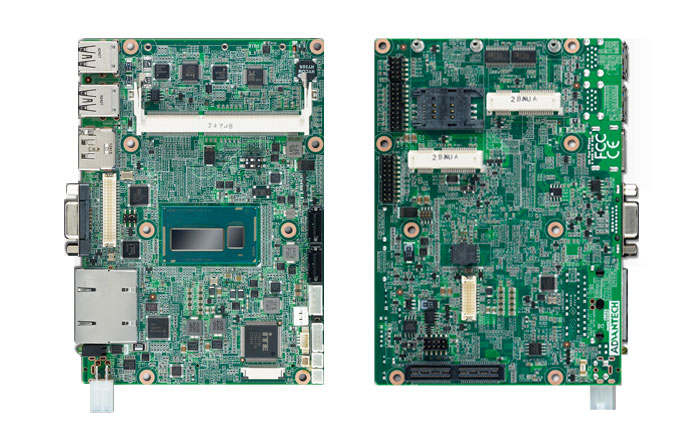
As of summer 2014, Advantech offers seven MI/O SBCs, about half a dozen MI/O extension modules, MI/O extension evaluation boards, and also a stackable MI/O Extension chassis. The expanding lineup seems a smart bet as with the rapid growth of Internet of Things (IoT) and intelligent systems, today's applications are generating increasing volumes of data, and thus escalate demand for greater performance, high network connectivity, and smarter manageability.
Below is a schematic of the Advantech MIO-5270:
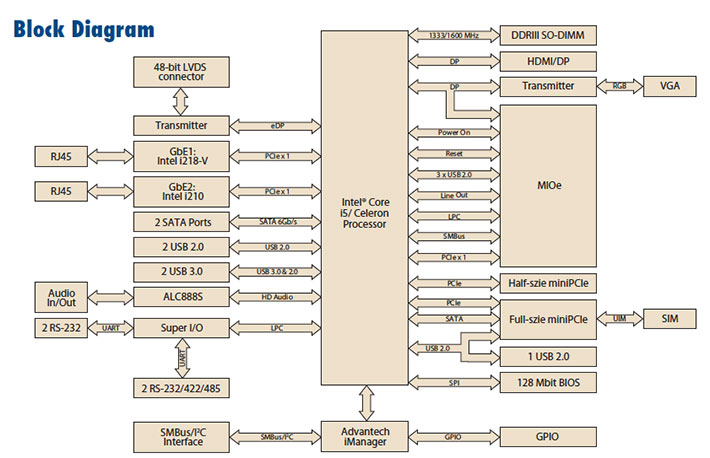
We're still relatively early in the life of the MI/O Extension Single Board Computer standard (which Advantech makes available to others as well). 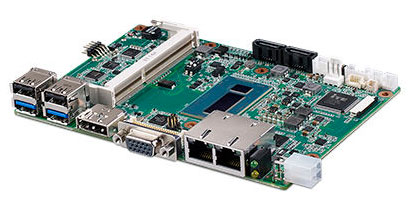 MI/O is in many respects similar to the PC104 standard with its stackable architecture, and has many of the same advantages. MI/O is in many respects similar to the PC104 standard with its stackable architecture, and has many of the same advantages.
Add to that MI/O's special attention to optimal thermal design, minimal cabling, compact mechanicals and value-added integrated software services, and this new platform looks like a modern and promising solution in the integration-ready SBC space in general, and for IoT projects in particular.
As for the MIO-5271, it's a flexible, almost infinitely expandable and configurable, and very compact embedded solutions board capable of providing the processing and graphics performance of a high-end mobile tablet or notebook computer.
To learn more about the MI/O standard and products, check these resources:
Advantech MIO-5271 Specs:
| Status |
Added 07/2014
|
| Type |
MI/O-Compact Single Board Computer
|
| CPU Type |
Dual-core Intel Core i5-4300U
Dual-core Intel Celeron 2980U
|
| Clock Speed |
1.9GHz (2.9 turbo)
1.6GHz (no turbo)
|
| Chipset |
Integrated Intel 8 Series
|
| BIOS |
AMI UEFI 128Mbit
|
| Memory |
Max 8GB DDR3L 1333/1600MHz in 1 204-pin SODIMM socket
|
| Graphics Controller |
Core i5-4300U: Intel HD Graphics 4400
Celeron 2980U: Intel HD Graphics |
| VGA |
Up to 1920 x 1200
|
| LVDS |
Dual channel 24-bit LVDS, max resolution up to 1920 x 1200
|
| HDMI |
Supports HDMI v1.4, max resolution up to 3200 x 2000 at 60 Hz on DisplayPort, 4096 x 2304 at 24 Hz on HDMI
|
| Multi display |
VGA + HDMI/DP, VGA + LVDS, HDMI/DP + LVDS, VGA + HDMI/DP + LVDS
|
| LAN |
2 x 10/100/1000Base-T (Intel i218 and Intel i210) |
| SATA |
2 x 600 MB/s |
| Expansion |
1 x full-size Mini PCI Express w/ SIM, 1 half-size Mini PCIe, 1 x MIOe
|
| Cfast |
No
|
| SMBUS |
Supported
|
| I2C (shares with SMBUS pin) |
Supported
|
| SSD |
Supported
|
| USB |
2 x USB 3.0, 2 x USB 2.0
|
| Serial |
2 x RS232 from COM1/2, 2 x RS232/422/485 from COM3/4 |
| Parallel |
NA |
| Audio |
Realtek ALC888S,, HD Audio, Line-in, Line out, Mic-in |
| GPIO |
8-bit general purpose input/output |
| Watchdog Timer |
programmable counter from 1 ~ 255 minutes / seconds
|
| Size |
146 mm x 102 mm (5.7" x 4.0")
|
| Weight |
0.84 kg (1.87 lb), weight of total package |
| Operating Temp. |
32° to 140°F (0° to 60°C)
|
| Price |
US$953 (Core i5-4300U), US$541 (Celeron 2980U)
|
| Datasheet |
Advantech MIO-5271 |
| Manual |
Advantech MIO-5271 |
Advantech Corporation
38 Tesla, Suite 100
Irvine, CA 92618
Toll Free: 1-800-866-6008
Ph: 949-789-7178
Fax: 949-789-7179
ECGInfo@advantech.com
www.advantech.com
Advantech Co. Ltd.
No.1, Alley 20, Lane 26, Rueiguang Road
Neihu District, Taipei Taiwan 114, R.O.C.
Tel: 886-2-2792-7818
Fax: 886-2-2794-7301
www.advantech.com
|

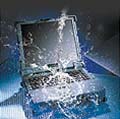

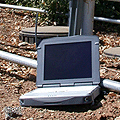

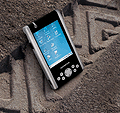
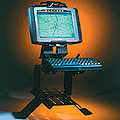





 The drawback is that standards-based boards do not always support all interface requirements for a project, and despite the large number of board standards, there simply may not be one that fit special project needs.
The drawback is that standards-based boards do not always support all interface requirements for a project, and despite the large number of board standards, there simply may not be one that fit special project needs.



 MI/O is in many respects similar to the PC104 standard with its stackable architecture, and has many of the same advantages.
MI/O is in many respects similar to the PC104 standard with its stackable architecture, and has many of the same advantages.